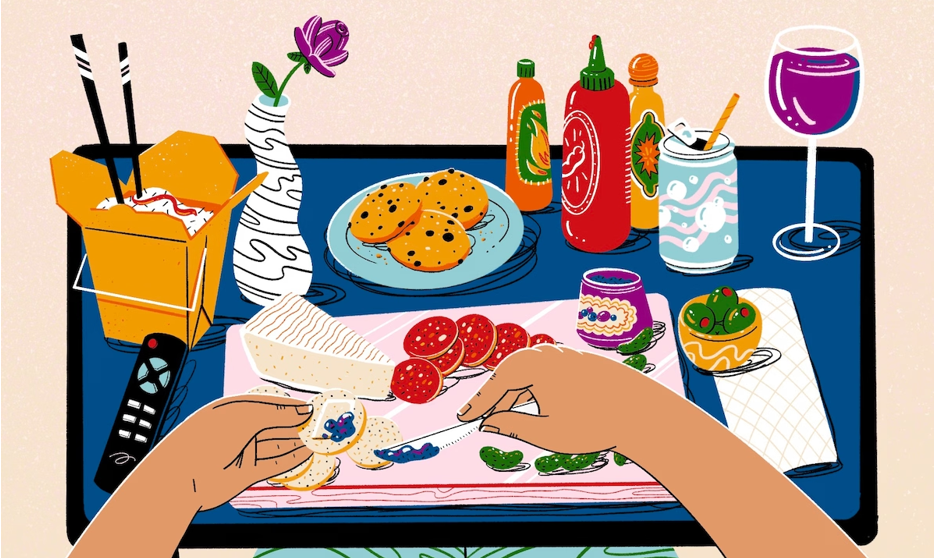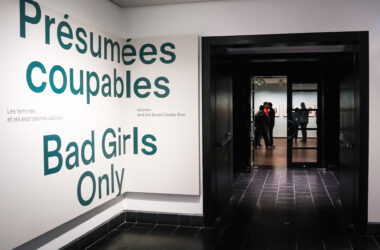Content Warning: Discussion of disordered eating
“Girl dinner,” a recent TikTok sensation, reveals what’s lurking in the backs of refrigerators and cupboards at dinnertime when you have procrastinated grocery shopping. An experience resonating with people of all genders, it shows creators poking fun at makeshift meals. While “girl dinner” started as a simple internet trend, it has led to spin-offs such as “girl math” and, intriguingly, “girl hammers.” It also raises questions about the immediate popularity of a simple (and controversial) label, especially now that people are starting to move away from a reliance on gender-based speech.
“Girl dinner” originated from a TikTok posted by user Olivia Maher on May 12, 2023. In her simple meal of bread, cheese, pickles, and grapes, she coined the phrase in relation to a “medieval peasant” dinner. Fast-forward four months, and it now denotes a meal consisting of assorted foods requiring little cook time and no advanced planning. For example, my personal “girl dinner” might include hard-boiled eggs, Cheetos, fruit roll-ups, and an apple. Videos of people showing off their “girl dinners” started popping up everywhere. For many, this trend was a way to poke fun at a surprising commonality: Eating whatever is available after a long day of working, studying, or just living. People rejoiced in the realization that others too took off-nights from planning meals and ate whatever fulfilled their immediate needs.
However, the trend has also met some backlash, as some consider it an encouragement of eating disorders. Critics have noted the unhealthy eating styles being depicted, pointing out they could be used to promote counting calories or limiting nutrition. These are valid points. The key to approaching this with a healthy mindset is to make sure one’s “girl dinner” is nutritionally satisfying, while also recognizing that the trend promotes occasional scenarios rather than a lifestyle.
Let’s get into semantics, though. What do people mean when they pair “girl” with a noun or verb? It can be empowering, such as “hot girl walk,” or reductive like the age-old phrase, “You play like a girl.” While it may appear nit-picky or overly sensitive to critique a phrase made in jest that women around the world use, the meanings behind and consequences of gender-specific language should always be analyzed and critiqued to avoid misogyny.
Another example is the now-viral “girl math,” which originated from a New Zealand radio show, “Fletch, Vaughan, & Hayley.” “Girl math” entails justifying the purchase of exorbitantly priced items by estimating how many times it may be used or how a person may be saving in other ways. “Girl math” has no real rules, but rather rationalizes purchases otherwise considered frivolous.
The modifier “girl” is reminiscent of roles historically considered “women’s work” – essential tasks deemed mentally trivial but which required ingenuity and resourcefulness. Some people view these non-academic reasonings about how humans actually function as ‘less than.’ This also ties back to women when one considers the traditional roles women inhabited in the domestic sphere.
These alternative “girl” ways of operating push against traditional, often male-dominated, ways of conceptualizing common-day occurrences. Dinner is supposed to be the main meal of the day and requires effort, planning, money, and time to create. “Girl dinner” is more realistic to the lifestyles of time-crunched individuals living busy lives; a “snack dinner” or more tapas-style meal is nutritionally satisfying for the individual and saves time and money. “Girl math” is also practical; if you use an expensive hair dryer every day, then it’s worth the cost.
These trends aren’t invalid or frivolous. They make use of what people have on hand and represent it in a humorous and self-reflective way. They show the power of alternative ways of thinking. By using “girl” as an identifier, it represents a break from the “normal” approach to an idea.
While using gendered terms is not ideal, as some consider it reductive, it also moves us toward recognizing unconventional approaches to work. So the next time one references “girl dinner” or “girl math,” think of it as a small act of rebellion, toward normalizing resourcefulness in search of social transformation for eating, living, and being.









